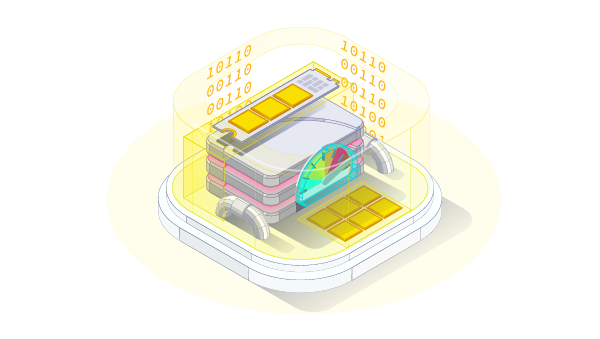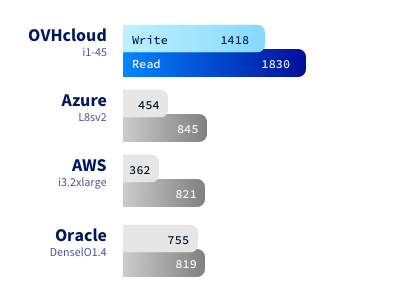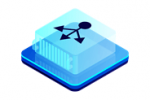
Cloud servers adapted for high transactional performance
IOPS instances deliver the fastest disk transactions in the Public Cloud range. They offer direct access to NVMe drives, each of which deliver at least 400,000 read/write operations per second. And like our other instances, you get the advantages of on-demand resources and hourly billing. These cloud solutions are designed to host database (DB) servers and big data applications.
NVMe for bandwidth
Unlike standard SSD disks, NVMe (Non-Volatile Memory Express) drives use NAND flash memory cells to store data. With their PCI Express connectors, which until recently were only used by devices like graphic cards, the bottleneck created by the SATA connection is cleared.
The PCI Passthrough feature for latency
To get the very most out of their PCI Express bus access, IOPS instances can access the hardware directly with the PCI Passthrough feature. There is no virtualisation layer to access the drive, which means you benefit from all of the available performance.
Some features of virtual instances are limited, such as snapshotting and live migration. Special care must also be taken with the data on NVMe drives, with regard to backup.
1 to 4 drives for IOPS
We offer instances with 1 to 4 NVMe drives, which each offer 1.9TB storage and a minimum of 400,000 IOPS. These configurations are useful when you need to process large volumes of data, and also require exceptionally high performance. The IOPS-price ratio is one of the best on the market, and is miles ahead of other solutions.
ISO/IEC 27001, 27701 and health data hosting compliance
Our cloud infrastructures and services are ISO/IEC 27001, 27017, 27018 and 27701 certified. These certifications ensure the presence of an information security management system (ISMS) for managing risks, vulnerabilities and implementing business continuity, as well as a privacy information management system (PIMS). Thanks to our health data hosting compliance, you can also host healthcare data securely.
Use cases
NoSQL - MongoDB database
MongoDB is a document-oriented database management system, and is often used within large infrastructures. It can manage high volumes of data, and often requires high levels of disk access. It can be used in a cluster, and can be deployed on several i1 instances.
Big data - Hadoop
Hadoop is a distributed, resilient big data framework that can manage petabytes of data. Its HDFS file system is scalable, and can be distributed across a high number of i1 nodes to deliver the very best performance during MapReduce operations.
Search engine - Elasticsearch
During its indexing phase, Elasticsearch requires a very quick response time for read/write operations. Furthermore, each search needs to deliver a quick response. i1 instances provide Elasticsearch with all of the power required for one of the most widely-used search services.
“The difference we saw is really impressive. OVHcloud servers offer nearly twice as much performance compared to other providers, and they are also the most accessible solutions.”
CloudSpectator (read the blog post)
Number of IOPS for 1 dollar

Cloud Spectator is a benchmarking and consulting firm in the cloud computing industry, with proven experience in measuring performance. Their report is clear — the price-performance ratio places OVHcloud far ahead of other popular players on the market, such as AWS and Azure. It even beats Oracle, which until recently offered one of the best solutions in the sector.
The NVMe drives integrated by OVHcloud are a key reason these results are such a success. Each NVMe drive delivers 400,000 read/write operations per second. Its success can also be attributed to minimal latency, at less than 1ms — and high bandwidth, at around 9Gbit/s.
How to
Get started
Boot your instance, and choose the best model and operating system for you.
Configure
The NVMe drives are directly accessible as block devices. You can use them via system tools like a volume manager, or directly from the database manager.
Use
Your instance is ready to deliver a high level of transactional performance.


Features
Standard block storage access
Since NVMe drives are presented via PCI Passthrough, they appear as standard block storage devices, and can be used by your usual device management tools.
Guaranteed resources
Performance is guaranteed for each NVMe drive. The resources are not consumed by neighbouring instances under any circumstances.
RAID configuration to suit your needs
NVMe drives are directly accessible in block mode. For example, you can mount a software RAID to multiply performance even more (RAID 0) or ensure redundancy (RAID 1).

IOPS billing
IOPS instances are billed like all of our other instances, on a pay-as-you-go basis at the end of each month. The price depends on the size of the instance you have booted, and the duration of its use.
Other products
Relational database instances
Our instances are perfect for creating relational databases that require high performance. These instances need to read and write very high volumes of data in a minimal amount of time. As a result, the RAM and processor are highly-demanded resources, and a high volume of storage space is needed to store the data. It is always important to think about which instances will be best adapted to your usage – in terms of performance, compatibility, platforms, and more.
Your questions answered
What SLA does OVHcloud guarantee for an IOPS instance?
The SLA guarantees 99.9% monthly availability on IOPS instances. For further information, please refer to the Terms & conditions.
Which hypervisor is used for instance virtualisation?
Just like other instances, GPU instances are virtualised by the KVM hypervisor in the Linux kernel.
What is PCI Passthrough?
Cards with GPUs are served via the physical server's PCI bus. PCI Passthrough is a hypervisor feature that allows you to dedicate hardware to a virtual machine by giving direct access to the PCI bus, without going through virtualisation.
Can I resize an IOPS instance?
This instance type cannot be resized.
Is the RAID configured automatically for NVMe drives?
NVMe drives are not delivered with any specific configuration. You can choose a software program to create the configuration you want via the system (e.g. with mdadm), or directly with your database if this option is supported.
Can I back up an IOPS instance?
You can back up the system disk of an IOPS instance. However, the data on the NVMe drives will not be backed up. If you would like to back up the data on the NVMe drives, you will need to find and use a software solution for this purpose.
Can I migrate an IOPS instance?
IOPS instances are linked to the data on the NVMe drives. This means you cannot move an instance from one hypervisor to another.
Do IOPS instances have anti-DDoS protection?
Yes, our anti-DDoS protection is included with all OVHcloud solutions at no extra cost.
Over the course of a month, can I switch to hourly billing from an instance that is currently billed monthly?
If you have monthly billing set up, you cannot switch to hourly billing over the course of the month. Before you launch an instance, please take care to select the billing method that is best suited to your project.


